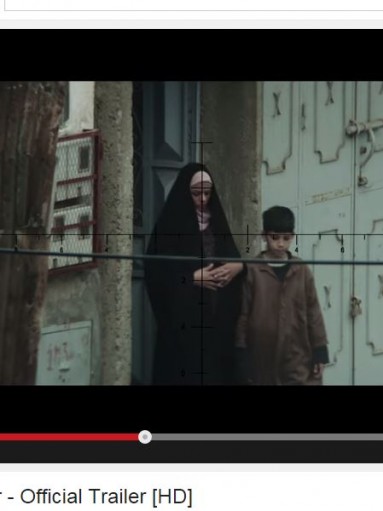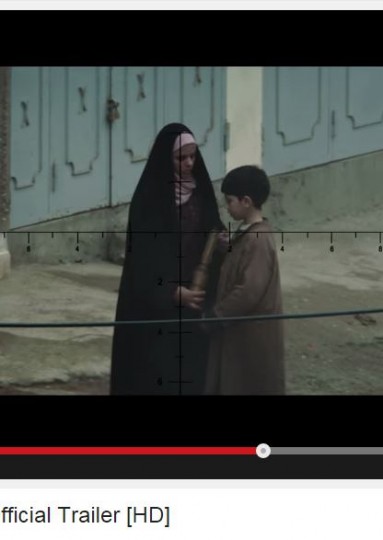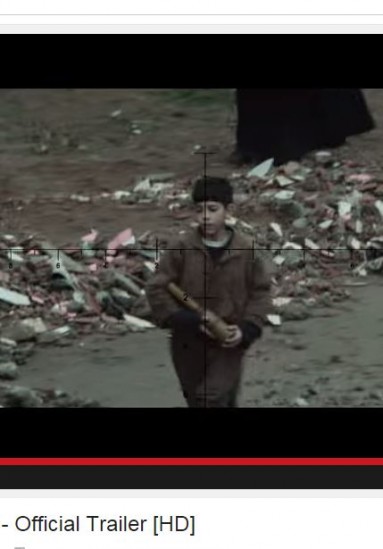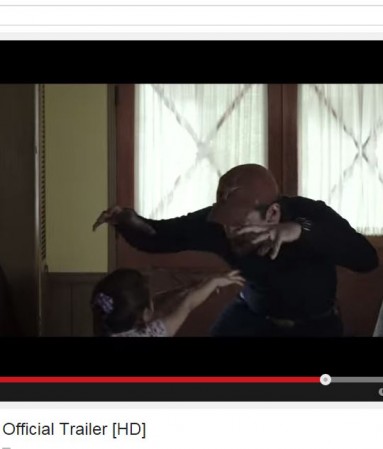Chris Kyle lived by the sword and died by it. If I were religious, I might pray for his soul. I imagine that his soul could use the prayers. He was a serial killer, seemed quite viciously racist, and he said a great many things about himself that appear not to be true, but which would be really horrifying if they were true. He once bragged about killing thirty “looters” in New Orleans after Katrina, to pick just one example, and it’s a good thing he was making that up. Imagine if, in the middle of one of the worst disasters in recent American memory, Chris Kyle set out to execute people who took much-needed food and supplies from the shelves where they had been left. Imagine if he went to New Orleans not to bring supplies and relief, but to finish the job started by the hurricane. The monstrousness of this desire staggers the imagination, but it apparently did not stagger his: he was apparently happy to imagine that this is what he had done. It is a good thing he was a liar. But what kind of person would pretend that he had done such a thing, would invent that fantasy and brag about it to his fellow SEALS, later? Is such a human being still human? If we have souls, then spare some prayers for his.
Chris Kyle was a drone. The metaphor is apt on so many levels that it isn’t even a metaphor. It’s just a simple description. He was a drone, a machine for killing without conscience. You might even describe him as "un-manned."
Over at the Atlantic, Megan Garber doesn't use that word, but she made the analogy quite plainly without it, calling a sniper “an almost mythical union of man and gun, a modern-day mixture of centaur and centurion” and “the closest the military has come to creating a human killing machine”:
The sniper may, like other soldiers, be subject to the cold anonymities of bombs and bullets. But his mission is specialized, and personalized. He finds his target, moving and warm. He aims. He “eliminates” and “neutralizes” and every other euphemism we use to separate the logic of war from the logic of murder.
I haven’t seen American Sniper, but I’ve seen the trailer, and that was plenty. A trailer is a movie's tl;dr, the essential kernel of a movie's case for itself.
The trailer shows a drone operator, seeing all and making the call. A man on a phone; he chooses not to shoot. A woman and child; he chooses not to shoot. The woman gives the child an explosive; he agonizes. The child begins to trot towards some troops; he hesitates. He suffers. He makes a decision. The trailer ends.
We don’t see him shoot, of course, though we know that he has done so. The information presented in the trailer has been sufficient to know exactly what the right thing to do is. We have literally seen the child carrying an explosive—which Kyle precisely identifies as an RKG-3 Russian grenade—and we see the child running towards a group of vulnerable and unsuspecting American Troops. If he shoots the child, he will Save American Lives; if he doesn’t, American Lives Will Be Lost. It is his job to save American lives by killing non-Americans, and we know that he is good at his job. Obviously he pulls the trigger.
Does he regret it? Do we?
A drone, a real drone, would be a soulless killing machine, a terminator. And this is what Chris Kyle apparently was: remorseless, lacking in empathy, able to thoroughly dehumanize the people he killed. He was a good sniper, and those are qualities that make a good sniper.
The story told in that trailer is a version of the anecdote with which Chris Kyle begins his book, a prologue entitled “Evil in the Crosshairs.” But Eastwood has told it very differently. His trailer shows us an empathic, tortured soldier forced to make a decision—indeed, he has to make that decision on his own, because only he can see what’s happening. His spotter reminds him that “they’ll burn you if you’re wrong,” implying that the safe choice would be to be cautious, not to shoot. Then we see a soldier in a hospital bed, reminding us the cost in American Lives of too much caution. To add another level of pressure onto our hero, the camera has been cutting back and forth between Kyle-as-sniper and Kyle-as-paterfamilias, doing so with the same jarring and unsettling ease that a drone operator in Northern Virginia might feel, hovering over the Pakistan by day—an all-seeing God of War—and driving home to the suburbs after work, there to pretend to be a normal all-American patriarch of an all American family. In my favorite image of the trailer, we see the father as drone, threatening child:
This forced parallel—between the Kyle-as-sniper, killing a child, and Kyle-as-father, hovering above his own child—is Clint Eastwood ratcheting up the tension between white protector and white killer. Eastwood makes us see that a child is a child is a child: in killing a child, the camera agonizes, Kyle was killing a child like his own. More importantly, Eastwood makes us see Kyle seeing that. The emphasis is not on the lives that are extinguished, but on the killer who does so. We are forced to feel—through Bradley Cooper’s soulful eyes and haunted memory—an ambivalence about killing that Chris Kyle shows no sign of having felt.
In the prologue to his book, Chris Kyle tells the story quite differently. The scene is set in “Late March 2003. In the area of Nasiriya, Iraq,” and begins with these words:
“I looked through the scope of the sniper rifle, scanning down the road of the tiny Iraqi town. Fifty yards away, a woman opened the door of a small house and stepped outside with her child.”
A moment later, he shoots her, saving lives.
Several things strike you, if you read this scene expecting to find Bradley Cooper’s ambivalence, the courage to make a hard or impossible choice (and the suffering that follows). For one thing, there is no individual agency. Kyle doesn’t make the decision (none of this “they’ll take your badge if you’re wrong” stuff); he sees something yellow, is told that it’s a grenade, is told to shoot, and he does shoot. He’s not a cowboy; he’s an executioner, just one piece of a complex machine. He does his job, does what he is told to do:
"Marines are coming," said my chief as the building began to shake. "Keep watching."
I looked through the scope. The only people who were moving were the woman and maybe a child or two nearby.
I watched our troops pull up. Ten young, proud Marines in uniform got out of their vehicles and gathered for a foot patrol. As the Americans organized, the woman took something from beneath her clothes, and yanked at it.
She'd set a grenade. I didn't realize it at first.
"Looks yellow," I told the chief, describing what I saw as he watched himself. "It's yellow, the body--"
"She's got a grenade," said the chief. "That's a Chinese grenade."
"Shit."
“Take a shot."
"But--"
"Shoot. Get the grenade. The Marines--"
I hesitated. Someone was trying to get the Marines on the radio, but we couldn't reach them. They were coming down the street, heading toward the woman.
"Shoot!" said the chief.
I pushed my finger against the trigger. The bullet leapt out. I shot. The grenade dropped. I fired again as the grenade blew up.
It was the first time I'd killed anyone while I was on the sniper rifle. And the first time in Iraq--and the only time--I killed anyone other than a male combatant.
This scene sets the tone for the entire book. Given the heavy-handed symbolism of Eastwood’s version—cutting back and forth, again and again, between white mother and child and Iraqi mother and child, just to make sure you absolutely get it—I don’t think it’s quite inappropriate to look awry at some of these details. For example, the first time the real Chris Kyle kills—his first time—it’s a woman who hides something threatening under her clothes that he kills with his gun. He does it for his brothers. Eastwood wants to make us feel anguish about children and parents, but the real Chris Kyle was minding those the “Ten young, proud Marines in uniform,” much less a patriarch than a fratriarch. Eastwood gives us the ambivalence of a father killing a child; Kyle gives us bros before hoes: to protect his brothers, he must kill this woman, and does.
Chris Kyle liked to tell stories that suited his worldview more than they matched the actual world, so it’s not surprising that the details of his story support the justice of his actions. In his account, women and children are not collateral damage, but clear and present dangers. While reassuring us that the vast majority of people he kills are men, he also shows us how women and children are legitimate targets. More importantly, despite the “fog of war,” the decision to kill is the right one. Chris Kyle has a little bit of information—he sees something yellow—and it is enough to act on. It is a grenade. It is always a grenade.
It was my duty to shoot, and I don’t regret it. The woman was already dead. I was just making sure she didn’t take any Marines with her.
It was clear that not only did she want to kill them, but she didn’t care about anybody else nearby who would have been blown up by the grenade or killed in the firefight. Children on the street, people in the houses, maybe her child . . .
She was too blinded by evil to consider them. She just wanted Americans dead, no matter what.
My shots saved several Americans, whose lives were clearly worth more than that woman’s twisted soul. I can stand before God with a clear conscience about doing my job. But I truly, deeply hated the evil that woman possessed. I hate it to this day.
Savage, despicable evil. That’s what we were fighting in Iraq. That’s why a lot of people, myself included, called the enemy “savages.” There really was no other way to describe what we encountered there.
People ask me all the time, “How many people have you killed?” My standard response is, “Does the answer make me less, or more, of a man?”
The number is not important to me. I only wish I had killed more. Not for bragging rights, but because I believe the world is a better place without savages out there taking American lives. Everyone I shot in Iraq was trying to harm Americans or Iraqis loyal to the new government.
Chris Kyle was a drone if he was a machine that would kill without needing to know why, and which would not regret it afterward. He showed no sign of having a soul. People have asserted that Chris Kyle was a racist, but if we take his book seriously, then he was something much worse. He was a machine for killing. A racist hates a particular kind of person, not only deems them less than human but needs or wants to hate them for some human, broken reason. A racist hates particularly. But Chris Kyle was not that. He didn’t hate the Iraqi people in particular, because he didn’t care enough about them to hate them. It wasn’t about them; it was about him. If necessary, he would kill anyone. Anyone could be a non-person. Anyone could be evil. Anyone could be a savage, and the moment they’re a savage, it becomes necessary to exterminate them.
Drones are a solution to the problem that human beings start off with souls, and need to be taught to kill. Unmanned aircraft, they solve the problem of a human disinclination to kill women and children without mercy. These are problems for the U.S. military, now that—since Vietnam or so—the default mode of military engagement is occupation and counter-insurgency, the U.S. military finds itself killing lots of people who aren’t holding a gun and shooting at you. A person with a soul might hesitate to fire missiles at a wedding party. This is a problem because the way you crush an insurgency is to be maximally bloodthirsty, to kill and kill and kill, without hesitation or reservation, and then to kill some more. This is a lesson that colonial occupying powers learned over and over again, over the course of the long 19th and 20th century imperial era, and it remains true today. There is very little that an invading, occupying power can do to “win” hearts and minds; it can only destroy enough of them that the rest go silent, for a while.
On some level, the US “lost” the Vietnam war because it was politically impossible to be indiscriminately murderous enough to win. It was always possible to “win” these wars: as WWII reminds us, a good way to make an occupation successful is to drop a nuclear bomb on a city. And then drop another one, just to show you can. Obviously, this kind of “victory” needs some incredibly strong scare quotes. But as John Rambo became massively popular in the 1980’s by explaining, “we” could have won the war in Vietnam if they’d let us win, ad this is the kind of fantasy victory we weren’t allowed by reality to have. All “we” would have had to do was treat the entire country as a legitimate military target, and accept the fact that we might have to burn down every village in order to save them, along the model of Hiroshima and Nagasaki. After all, if you exterminate all the brutes, then the problem is solved.
There are reasons why this was not done, of course—though the military came a lot closer to killing anything that moves in Vietnam than was or is generally recognized—but one of them is that genocide would have hurt the Democrats electorally. Alas! It was therefore always necessary to distinguish the naked and unrelenting military terrorism that would be required to crush a guerrilla insurgency from the honorable military campaigns that American voters were willing to accept and imagine. Euphemisms kept “our” hands clean, or clean enough, to pretend that moments of clarity, like “It became necessary to destroy the town to save it,” were the exception rather than the rule.
In this nonsense sense, “we” also “lost” in Iraq; we could have won the war, if we had been willing to kill indiscriminately, to murder millions quickly (rather than merely kill hundreds of thousands slowly). The insurgency dragged on because we didn’t simply drop the bomb on Baghdad and destroy the city. There are reasons why we didn’t do that, of course, but it was never unthinkable; as terms like “shock and awe” remind us, we have always known what we had to do to “win” the war: kill basically everybody. Bomb them into the stone age, etc. Make Baghdad into a parking lot. Etcetera. And as Bijal Trivedi observed at the time, the bombing of Baghdad didn’t “trigger” shock and awe because it was too precise:
“Even after several days of bombing the Iraqis showed remarkable resilience. Many continued with their daily lives, working and shopping, as bombs continued to fall around them. According to some analysts, the military's attack was perhaps too precise. It did not trigger shock and awe in the Iraqis and, in the end, the city was only captured after close combat on the outskirts of Baghdad.”
Note the logic of this paragraph: the desired effect was not achieved because “Many [Iraqis] continued with their daily lives.” Which is to imply without quite saying the underlying fantasy of the shock and awe campaign: the desired effect was that many Iraqis not continue with their daily lives. The US military has the technological capacity to do this. If they were willing to kill, say, half the population of Baghdad, maybe the war would have been over in weeks. If not, they could then kill the other half.
If Chris Kyle didn’t have it within his power to kill 50% of the population of Baghdad, American Sniper shows that he would have done so, if he were told to do so. Iraqi lives are meaningless to him. As he writes:
I didn’t risk my life to bring democracy to Iraq. I risked my life for my buddies, to protect my friends and fellow countrymen. I went to war for my country, not Iraq. My country sent me out there so that bullshit wouldn’t make its way back to our shores. I never once fought for the Iraqis. I could give a flying fuck about them.
If you “could give a flying fuck about them,” and if your paramount objective is to keep “that bullshit” from coming to the USA, then logically, why wouldn’t you simply kill all of them? Why would there be an upper limit to how many people you would kill? The answer is that there wouldn’t be. If you take seriously the things he says—if you believe him when he says things like this—then you cannot escape the logical conclusion of such sentiments, which is that dropping the bomb on Baghdad is probably the best way to proceed. But, failing that, you could settle for just shooting 255 people. If you "believe the world is a better place without savages out there taking American lives," as he wrote, then there is nothing surprising in the fact that his one real regret was "I only wish I had killed more."
Eastwood’s film gives Chris Kyle a soul, puts a ghost in the machine. Instead of cog in a killing machine—skillful precisely to the extent that he could give a flying fuck about “them”—Eastwood makes Kyle a killer with a conscience, torn between competing necessities: to be a killer and to be a dad. Bradley Cooper’s character needs to have it both ways—as we do—and so he is torn apart by the contradiction. He agonizes. He is scarred. In the grand tradition of Hurt Locker and Zero Dark Thirty, war is hell for the winner. Let’s pray for Chris Kyle’s soul by hoping that Bradley Cooper got it right. Let’s pray he wasn’t the sociopath his own words make him out to be. Because what’s chilling about Chris Kyle’s book is that there is no sign of any such conflict. War is fun. Killing is love:
I loved what I did. I still do. If circumstances were different--if my family didn't need me--I'd be back in a heartbeat. I'm not lying or exaggerating to say it was fun. I had the time of my life being a SEAL. People try to put me in a category as a bad-ass, a good ol' boy, asshole, sniper, SEAL, and probably other categories not appropriate for print. All might be true on any given day. In the end, my story, in Iraq and afterward, is about more than just killing people or even fighting for my country. It's about being a man. And it's about love as well as hate.
Being a man is killing a woman is love is hate. Support the troops. Give a flying fuck. Be a drone.





